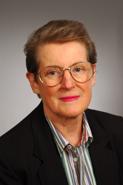
It is with great sadness that the Library marks the passing of one of our great friends and benefactors, Dr. Carol Ann Darline Litchfield, a renowned expert in microbial ecology and diversity, who left this life in the early morning hours of Tuesday, April 3rd.
Carol's connection to Hagley developed along with that of her husband, Dr. Charles Carter Litchfield, who researched our collections as a passionate independent historian after retiring from a successful career in chemistry. His enthusiasm for Hagley led Carter to donate a large (350 linear feet) collection on the history of fat- and oil-based products to Hagley that holds enormous research value. Together, Carol and Carter created the Litchfield Endowment Fund to support this collection and any others that the couple might donate to Hagley; her personal contribution to this fund was very generous, as was her support of the McNinch Endowment Fund for Reference and Outreach. A sense of the scale and scope of Litchfield Collection on the History of Fatty Materials can be seen in our online finding aid. The Litchfield Endowment Fund supported digitizing a portion of it. After Carter's death in 2007, Carol continued overseeing the transfer of the collection to Hagley. During these years, she developed a passion for Fireworks at Hagley.
Independently of Carter, Carol developed a collection devoted to the history of salts and expressed interest in donating this collection to Hagley. Like Carter, she published as an independent historian, eventually co-editing a volume of the Journal of Salt History in 2001 honoring noted French historian of salt and Venice, Jean-Claude Hocquet.
Carol also amassed a collection covering her career in microbiology, comprised of government studies, scholarly publications, and personal communications and notes that she gave to the library at George Mason University, her last employer. Both the salt and microbiology collections complement her research interests in extremophile organisms, particularly halophilic microorganisms that grow in high-salt environments.
Carol was born in Cincinnati, Ohio in 1936. After earning her masters in microbiology at the University of Cincinnati in 1960, she completed her academic training with a doctorate in organic biochemistry at Texas A&M University in 1969. Following a post-graduate project at the University of North Wales, Carol taught and researched during the next decade at Rutgers, where she also published some of her most influential work on marine biology (Marine Microbiology, 1976) and on bacteria in marine sediments (Microbial Contributions to Organic Mineralization in the Waters and Sediments of the New York Bight, 1979).
In 1980, Carol joined the DuPont staff at Haskell Laboratory as the Head of Environmental Toxicology, eventually becoming Senior Environmental Scientist for its bioremediation subsidiary. After 1990, Carol founded her own consulting company before returning to academe at George Mason University, serving first in the Biology Department and eventually in the Department of Environmental Science and Policy.
Carol was a doer as well as a thinker: she served on many advisory panels and professional societies over her career, including the New Jersey Governor's Panel on Coastal Waters in the mid-1980s and the US Department of Energy's Environmental Biotechnology Working Group in 1989. In 2007, she became the president of the Society for Industrial Microbiology and Biotechnology, which earlier this year bestowed on her the Charles Porter Award for exceptional service to microbiology and the Society.
Memorial Services honoring Carol's life will be held at the Unitarian Universalist Church of Arlington, VA, on Sunday, May 27th at 3 PM.
Photo courtesy of George Mason University
